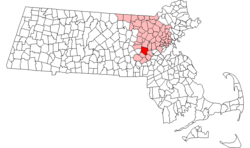Framingham, Massachusetts | |
|---|---|
 Plymouth Church in Framingham Center | |
 Location in Massachusetts | |
| Coordinates: 42°16′45″N71°25′00″W / 42.27917°N 71.41667°W | |
| Country | United States |
| State | Massachusetts |
| County | Middlesex County |
| Settled | 1650 |
| Incorporated | 1700 |
| Government | |
| • Type | Representative town meeting |
| Area | |
• Total | 26.4 sq mi (68.5 km2) |
| • Land | 25.1 sq mi (65.1 km2) |
| • Water | 1.3 sq mi (3.4 km2) |
| Elevation | 165 ft (50 m) |
| Population (2000) | |
• Total | 66,910 |
| • Density | 2,663.6/sq mi (1,028.4/km2) |
| Time zone | UTC-5 (Eastern) |
| • Summer (DST) | UTC-4 (Eastern) |
| ZIP code | 01701, 01702, 01703, 01704, 01705 |
| Area code | 508 / 774 |
| Website | www.framinghamma.gov |
This is a list of places of worship in the town of Framingham, Massachusetts. All institutions are listed in alphabetical order by faith, denomination and facility.


